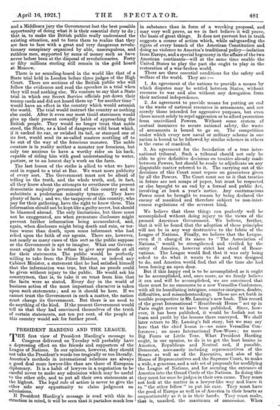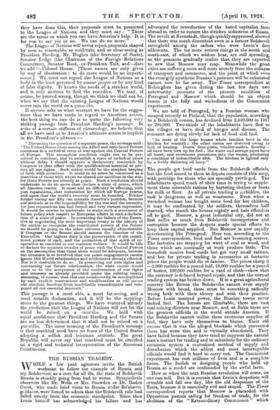PRESIDENT HARDING AND THE LEAGUE.
THE first view of President Harding's message to Congress delivered on Tuesday will probably have a depressing effect on the friends and supporters of the League of Nations. In our opinion, however, they should not take the President's words too tragically or too literally. America's methods in international relations are always a good deal more lawyer-like than are those of European diplomacy. It is a habit of lawyers in a negotiation to be careful never to make any admission which may be useful to the other side, and to put all their own statements at the highest. The legal rule of action is never to give the other side any opportunity to claim judgment on admissions.
If President Harding's message is read with this in- struction in mind, it will be seen that it partakes much less in substance than in form of a wrecking proposal, and may very well prove, as we in fact believe it will prove, the basis of great things. It does not prevent but in truth suggests a course of action which, while safeguarding the rights of every branch of the American Constitution and doing no violence to America's traditional policy—isolation from Europe, and a special hegemony in the affairs of the two American continents—will at the same time enable the United States to play the part she ought to play in the restoration of a war-broken world.
There are three essential conditions for the safety and welfare of the world. They are :— 1. An agreement of the nations to provide a means by which disputes may be settled between States, without recourse to war and also without any derogation from their national independence.
2. An agreement to provide means for putting an end to the waste of national resources in armaments, and not merely those intended for aggressive purposes, but even those meant solely to repel aggression or to afford protection from uncivilized Powers. Without some system of mutual insurance to secure national safety, the waste of armaments is bound to go on. The competition under which every new naval or military scheme in one nation is bound to be followed, by similar schemes in others is the curse of mankind.
3. An agreement for the foundation of a true inter- national tribunal. Such a tribunal should not only be able to give definitive decisions on treaties already made between Powers, but should be ready to adjudicate on any disputable matter referred to it. The carrying out of the decisions of this Court must repose on guarantees given by all the Powers. The Court must see to it that treaties in future are not scraps of paper, but must be respected or else brought to an end by a formal and public Act, involving at least a year's notice. Any contumacious Power must be brought to reason by being declared the enemy of mankind and therefore subject to non-inter- course regulations of the severest kind.
We believe that these things can perfectly well be accomplished without doing injury to the views of the present American Government. We believe, further, that it will be found that the adoption of these principles will not be in any way destructive to the fabric of the League of Nations. Finally, we believe that the League, even if it changed its name to " The Association of Nations," would be strengthened and vivified by the entry of America, however strict her sheaf of Reser- vations. The League would find that it was only being asked to do what it wants to do and was designed to do, and America would find that all the time she had been forcing an open door.
But if this happy end is to be accomplished as it ought to be accomplished, and, once more, as we firmly believe it can and will be accomplished, we are convinced that there must be no summons to a new Versailles Conference, with all its humiliating intrigues, counter-intrigues, doubts, difficulties, and misunderstandings. These are set forth in terrible perspective in Mr. Lansing's new book. This record of the great International " Heartbreak House " set up in Paris ought never td have been published. Since, how- ever, it has been published, it would be foolish not to learn and profit by the lessons there conveyed. We shall later return to Mr. Lansing's full story, but we may say here that the chief lesson is—no more Versailles Con- ferences ; no more International Pow-Wows ; no more Big Fours or Little Tens. What President Harding ought, in our opinion, to do is to get the best brains in America, Republican and Neutral and, if possible, Democrat, necessarily including representatives of the Senate as well as of the Executive, and also of the House of Representatives and the Supreme Court, to make a wide, a generous, and a safe set of proposals for modifying the League of Nations, and for securing the entrance of America into the Grand Circle of the Nations. In doing this they must for once be judges in their own cause. They must not look at the matter in a lawyer-like way and leave it to "the other fellow_" to put his case. They must have the good of Europe as well as of-America in their hearts as unquestionably as it is in their hand% They must make, that is, unasked, the maximum . of concession. When they have done this, their proposals must be presented to the League of Nations, and they must say : " These are the urns on which you can have America's help. It is for you to say yes or no. We can do no more." The League of Nations will never reject proposals shaped by men so reasonable, so moderate, and so clear-seeing as President Harding, Mr. Hughes (the Secretary of State), Senator Lodge (the Chairman of the Foreign Relations Committee), Senator Root, ex-President Taft, and—dare we add ?—Colonel House. [These names are only given by way of illustration : to do more would be an imperti- nence.] We must not regard the League of Nations as a body in the least governed by amour propre or by any kind of false dignity. It knows the needs of a stricken world, and is only anxious to find the remedies. We may, of course, be proved wrong, though we think we shall not be, when we say that the existing League of Nations would. never ruin the world on a puncbilio.
If anyone asks us what warrant we have for the sugges- tions that we have made in regard to American action, the best thing we can do is to quote the following very striking passage from President Harding's message. In snite of a oertain stiffness of phraseology, we believe that all we have said as to America's ultimate action is implicit in the President's phrases :- "Discussing the question of a separate peace, the message said : ' The United States alone among the Allied and Associated Powers continues in a technical state of war against the Central Powers of Europe. This anomalous condition ought not to be per- mitted to continue, and to establish a state of technical peace without delay I should approve a declaratory resolution by Congress to that effect with the qualifications essential to pro- tect all our rights. Such action would be the simplest keeping of faith with ourselves. It could in no sense be construed as a desertion of those with whom we shared our sacrifices in the war, for these Powers are already at peace. Such a resolution should undertake to do no more than declare a state of peace, which all America craves. It must add no difficulty in effecting, with just reparations, that restoration for which all Eutope yearns, and upon that the world's recovery must be founded. Neither former enemy nor Ally can mistake America's position, because our attitude as to the responsibility for the war and the necessity for just reparations has had formal and very earnest expression. It would be unwise to undertake to make such a statement of future policy with respect to European affairs in such a declara- tion of a state of peace. In correcting the failure of the Execu- tive in negotiating the most important treaty in the history of the nation to recognize the constituted powers of the Senate we should be going to the other extreme equally objectionable if Congress or the Senate should assume the function of the Executive. Our highest duty is the preservation of the consti- tuted powers of each, and the promotion of that spirit of co- operation so essential to our common welfare. It would be idle to declare for separate treaties of peace with the Central Powers on the assumption that these alone would be adequate, because the situation is so involved that our peace engagements cannot re Old World relationships and settlements already. effected.
or is it desirable to do so. In preserving our own rights and contracting our future relationships, the wiser course would seem to be the acceptance of the confirmation of our rights and interests as already provided under the existing treaty, assuming, of course, that this can satisfactorily be accomplished by such explicit reservations and modifications as will secure our absolute freedom from inadvisable commitments and safe- guard all our essential interests."
This passage is a most able, a most far-seeing, and a most notable declaration, and it will be the stepping- stone to the greatest things. We have ventured already the prediction that the League of Nations will not let the world be ruined on a Ounctilio. We hold with equal confidence that President Harding and the Senate are no less determined that it shall not be ruined on a pur etilio. The inner meaning of the President's message is that mankind need have no fears of the United States adopting a selfish and inhuman attitude. The great Republic will never say that mankind. must be crucified on a rigid and technical interpretation of the American Constitution.



































 Previous page
Previous page